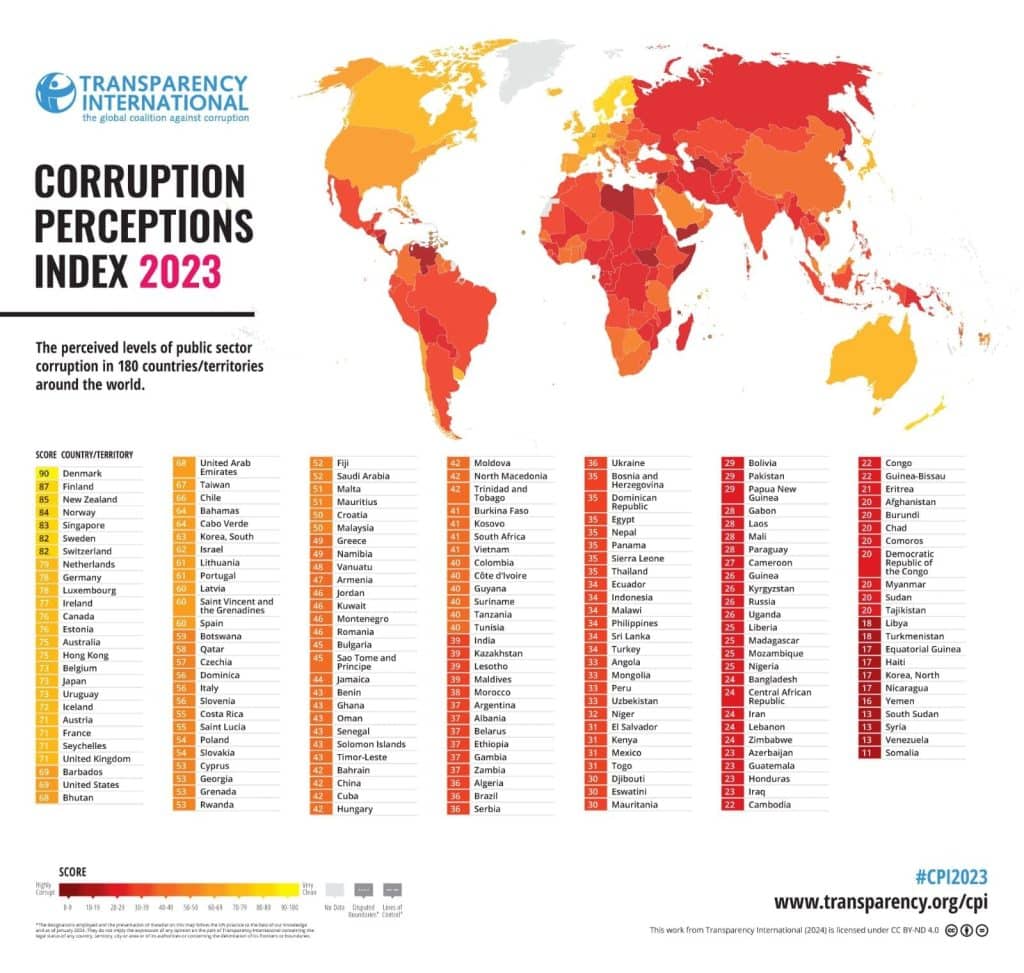2 de febrero 2024

Children of Exile: The Births “Sowing Hope” in the Camp of Nicaraguan Farmers

PUBLICIDAD 1M
PUBLICIDAD 4D
PUBLICIDAD 5D
Transparency International's 2023 Corruption Perceptions Index ranks Nicaragua 172nd among the 180 countries evaluated

Nicaragua ranks among the nine most corrupt countries in the world, according to the 2023 Corruption Perceptions Index (CPI) released on January 30th by Transparency International. It ranked as the most corrupt country in Central America, and second only to Haiti on the American continent.
According to the CPI, Nicaragua’s public sector scored 17 points, on a scale of 1 – 100 (where 100 is “very clean” and 0 is “highly corrupt”). This puts it on a par with North Korea, Equatorial Guinea and Haiti. Countries perceived as even more corrupt included Yemen (16 points); Venezuela, Syria and South Sudan, (13 points each); and Somalia (11 points).
“Venezuela, Haiti and Nicaragua presented the lowest scores, with a context of widespread impunity and a total absence of independence in the judicial branch,” noted the NGO based in Berlin, Germany.
In Venezuela and Nicaragua, two countries that have been ranked near the bottom in past years as well, scores dropped still further this year. “We’re speaking about dictatorships where there’s no division of power of any kind, and opaqueness reigns, while the borders between the legal and the illegal are extremely blurred,” Luciana Torchiaro, Transparency International’s regional advisor for Latin America and the Caribbean, told the EFE news agency.
Other Latin American countries that are perceived as sunk in corruption but fall in a more moderate range are: Cuba (42 points); Colombia (40); Argentina (37); Brazil (36); Dominican Republic (35); Panama (35); Ecuador (34); Peru (33); El Salvador (31) and Mexico (31).
Among the countries with the least perceived corruption are Denmark, once again receiving 90 points, followed by Finland with 87, and New Zealand with 85. The only three Latin American countries scoring above 50 were Uruguay (73), Chile (66) and Costa Rica (55).

“The sense of impunity and the inability of prosecutors and judges to proceed impartially and guarantee fair trials and equality before the law significantly impacts public trust in the judiciary,” the Transparency International report alerted.
“This, in turn, discourages reporting, as the institution is perceived as corrupt, unreliable, and unsafe. The most severely affected are the poorest and most vulnerable groups, such as women, indigenous people, Afro-descendants, sexual minorities, and migrants. These groups often experience discrimination when seeking justice,” the organization noted.
Transparency International says the lack of judicial independence puts the brakes on combatting corruption, and with two-thirds of the countries in the region scoring under 50 of the 100 possible points, the Americas continue facing serious challenges in the fight against corruption.
“The lack of independence of the judiciary in the region is one of the main problems. It undermines the rule of law and promotes impunity for the powerful and criminals, to the detriment of the people and the common good,” the report warned.
According to the organization, a robust and independent judiciary in the Americas would lead to more just societies, oriented to the common good and free of corruption and impunity.
The organization also explained that another factor facilitating corruption in Latin America and the Caribbean is the undue influence of political and economic elites.
In cases of extreme cooptation of judges and prosecutors by the political elites, as has been seen in Nicaragua, Guatemala and El Salvador, the Judicial Branch has become a tool for attacking the honest judges and prosecutors, the report denounced.
“Recently, in the two latter countries (Guatemala and El Salvador), the Judicial Power has been utilized to manipulate electoral processes, putting democracy at risk; and in the case of Nicaragua, it has been used to consolidate the dictatorship,” stated Transparency International.
Meanwhile, Luciana Torchiaro expressed concern about the case of Guatemala, one of the countries whose score has declined most since 2012 – 10 points. This is principally due to the construction of an economic and political elite in the country, following three consecutive governments tied to corrupt practices.
In Guatemala the so-called “Pact of the Corrupt” utilized different strategies to coopt the State institutions, principally the judicial power, in order to remain in power and be able to guarantee their impunity, she noted.
At the same time, Torchiaro has invested hope in newly inaugurated Guatemalan President Bernardo Arevalo, who has assumed power under “a very important anti-corruption banner.”
In Brazil, there’s been a “regressive tendency” in the struggle against corruption in the past few years, in which both the former president, Jair Bolsonaro, and the current president, Luiz Inacio Lula da Silva, have appointed people close to them to key posts such as Attorney General.
Chile, despite maintaining an outstanding position for the strength of its democratic institutions and high levels of transparency, is also considered one of the countries “to observe” by the organization, since its score has dropped significantly since 2014.
This is due to diverse cases of corruption that have tainted figures from nearly all the principal political parties and many of the major government institutions.
Nonetheless, Torchiaro displayed confidence that the country is poised to recover its leadership in the region, since its institutions remain much stronger than those in the rest of the countries. Also, Chile maintains a system of checks and balances that functions well, in addition to a national anticorruption strategy.
The Dominican Republic is the only Latin American country that improved its ranking on the 2023 Perceived Corruption Index, due to a number of factors, but mainly for the strengthening of its judicial system through independent appointments, the advisor stressed.
Transparency International underlined that the Americas: “urgently needs more robust and independent judiciaries to enhance justice, tackle impunity and face the growth of transnational corruption networks.”
Luciana Torchiaro also highlighted the responsibilities of citizens, who must demand accountability. She emphasized the opportunity citizens have in this “super electoral cycle” – including the elections that were held in 2023 and those scheduled for this year in the region – to exercise their votes “consciously” and not cede more ground to the corrupt.
This article was published in Spanish in Confidencial and translated by Havana Times. To get the most relevant news from our English coverage delivered straight to your inbox, subscribe to The Dispatch.
PUBLICIDAD 3M
Confidencial es un diario digital nicaragüense, de formato multimedia, fundado por Carlos F. Chamorro en junio de 1996. Inició como un semanario impreso y hoy es un medio de referencia regional con información, análisis, entrevistas, perfiles, reportajes e investigaciones sobre Nicaragua, informando desde el exilio por la persecución política de la dictadura de Daniel Ortega y Rosario Murillo.
PUBLICIDAD 3D